Related Research Articles

Kenneth Kaunda, also known as KK, was a Zambian politician who served as the first president of Zambia from 1964 to 1991. He was at the forefront of the struggle for independence from British rule. Dissatisfied with Harry Nkumbula's leadership of the Northern Rhodesian African National Congress, he broke away and founded the Zambian African National Congress, later becoming the head of the socialist United National Independence Party (UNIP).

The history of Zambia experienced many stages from colonisation to independence from Britain on 24 October 1964. Northern Rhodesia became a British sphere of influence in the present-day region of Zambia in 1888, and was officially proclaimed a British protectorate in 1924. After many years of suggested mergers, Southern Rhodesia, Northern Rhodesia, and Nyasaland were merged into the British Federation of Rhodesia and Nyasaland.

The politics of Zambia takes place in a framework of a presidential representative democratic republic, whereby the president of Zambia is head of state, head of government and leader of a multi-party system. Executive power is exercised by the government, while legislative power is vested in both the government and parliament. Formerly Northern Rhodesia, Zambia became a republic immediately upon attaining independence in October 1964.
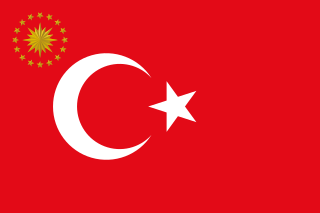
The president of Turkey, officially the president of the Republic of Türkiye, is the head of state and head of government of Turkey. The president directs the executive branch of the national government and is the commander-in-chief of the Turkish military. The president also heads the National Security Council.
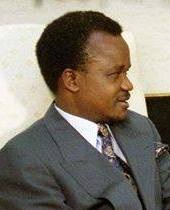
Frederick Jacob Titus Chiluba was a Zambian politician who was the second president of Zambia from 1991 to 2002. Chiluba, a trade union leader, won the country's multi-party presidential election in 1991 as the candidate of the Movement for Multi-party Democracy (MMD), defeating long-time President Kenneth Kaunda. He was re-elected in 1996. As he was unable to run for a third term in 2001, former Vice President Levy Mwanawasa instead ran as the MMD candidate and succeeded him. After leaving office, Chiluba was the subject of a long investigation and trial regarding alleged corruption; he was eventually acquitted in 2009.

The president of the Arab Republic of Egypt is the executive head of state of Egypt and the de facto appointer of the official head of government under the Egyptian Constitution of 2014. Under the various iterations of the Constitution of Egypt following the Egyptian Revolution of 1952, the president is also the supreme commander of the Armed Forces, and head of the executive branch of the Egyptian government.

The Movement for Multi-party Democracy (MMD) also known as New Hope MMD is a political party in Zambia. Originally formed to oust the previous government, MMD controlled an absolute majority in parliament between 1991 and 2001, when its past leader, Frederick Chiluba was President of Zambia. Its election into power in 1991 ended the 27-year rule of President Kenneth Kaunda and his United National Independence Party (UNIP). It remained the dominant party within Zambian politics until the general elections of September 2011.

The president of the Republic of Zambia is the head of state and head of government of Zambia and is the highest executive authority in the country. The president is elected by popular vote for a five-year term and is responsible for the administration of the government, overseeing the implementation of national policies, and representing Zambia in international affairs. The office was established at Zambia's independence in 1964. The current president is Hakainde Hichilema, who assumed office on August 24, 2021, following the 2021 presidential election where his party, the United Party for National Development, won a majority. The president's role includes appointing the Cabinet, serving as Commander-in-Chief of the Zambian Defence Force, and ensuring the enforcement of laws.

The United National Independence Party (UNIP) is a political party in Zambia. It governed the country from 1964 to 1991 under the socialist presidency of Kenneth Kaunda, and was the sole legal party in the country between 1973 and 1990. On 4 April 2021, Bishop Trevor Mwamba was elected President of UNIP.

Elections in Zambia take place within the framework of a multi-party democracy and a presidential system. The President and National Assembly are simultaneously elected for five-year terms.
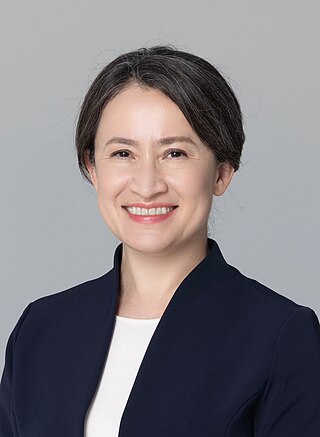
The vice president of the Republic of China, commonly referred to as the vice president of Taiwan, is the second-highest constitutional office of the government in Taiwan, after the president, and ranks first in the presidential line of succession.

The presidential line of succession defines who may become or act as President of the Federative Republic of Brazil upon the death, resignation, incapacity or removal from office of the elected president, and also when the president is out of the country or is suspended due to impeachment proceedings.

Michael Charles Chilufya Sata was a Zambian politician who served as the fifth president of Zambia from 2011 until his death in 2014. A social democrat, he led the Patriotic Front (PF), a major political party in Zambia. Under President Frederick Chiluba, Sata was a minister during the 1990s as part of the Movement for Multiparty Democracy (MMD) government. He went into opposition in 2001, forming the PF. As an opposition leader, Sata – popularly known as "The King Cobra", emerged as the leading opposition presidential contender and rival to President Levy Mwanawasa in the 2006 presidential election, but was defeated. Following Mwanawasa's death, Sata ran again in 2008, losing to Rupiah Banda.
Christianity has been very much at the heart of religion in Zambia since the European colonial explorations into the interior of Africa in the mid 19th century. The area features heavily in the accounts of David Livingstone's journeys in Central Africa.
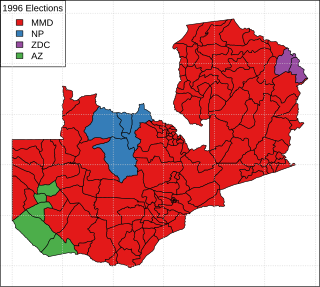
General elections were held in Zambia on 18 November 1996 to elect a President and National Assembly. They were boycotted by the main opposition party, the United National Independence Party, together with five other allied parties, following changes to the constitution which they failed to have reversed following a court challenge. The changes imposed a two-term limit on the presidency, required presidential candidates to be born to two Zambian citizens by birth or descent, and required National Assembly candidates to give up their chieftaincy. UNIP believed these changes were specifically aimed at their longtime leader, Kenneth Kaunda, whose parents were Malawian and had previously served as the country's first president from 1964 to 1991. The changes would have also excluded UNIP's vice president, a chief. Subsequently, the ruling Movement for Multi-Party Democracy won a comfortable victory in both elections, taking 131 of the 150 elected seats in the National Assembly, and its candidate, Frederick Chiluba, winning 73% of the vote in the presidential election.

Guy Lindsay Scott is a Zambian politician, who served as acting President of Zambia from 2014 to 2015, and was the Vice President from 2011 to 2014.
Fred M'membe is a Zambian journalist known for his editorship of the Zambia Post. He has received numerous international awards for his reporting. In 2000, the International Press Institute named him one of its World Press Freedom Heroes.
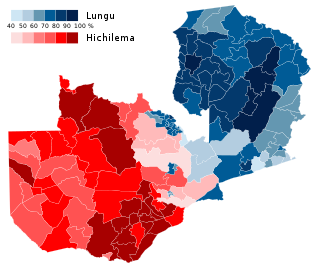
Presidential elections were held in Zambia on 20 January 2015 to elect a president to serve the remainder of the term of President Michael Sata, following his death on 28 October 2014.
Timeline of Zambia (Northern Rhodesia)
References
- 1 2 3 "Guy Scott's rise to Zambia's presidency". bbc.com. Retrieved 2014-10-29.
- 1 2 "After the Cobra: What does the law say about Vice-President Guy Scott?". eliasmunshya.org. Retrieved 2014-10-29.
- ↑ "Another Zambian president dies in office. What happens now? - The Washington Post". washingtonpost.com. Retrieved 2014-10-30.
- ↑ "Constitution of Zambia" (PDF). Archived from the original (PDF) on 26 June 2013. Retrieved 5 December 2014.
- ↑ Lewanika and Others v Frederick Jacob Titus Chiluba, 11ZMSCS.C.Z. Judgment No. 14 of 1998 (Supreme Court of Zambia10 November 1998).